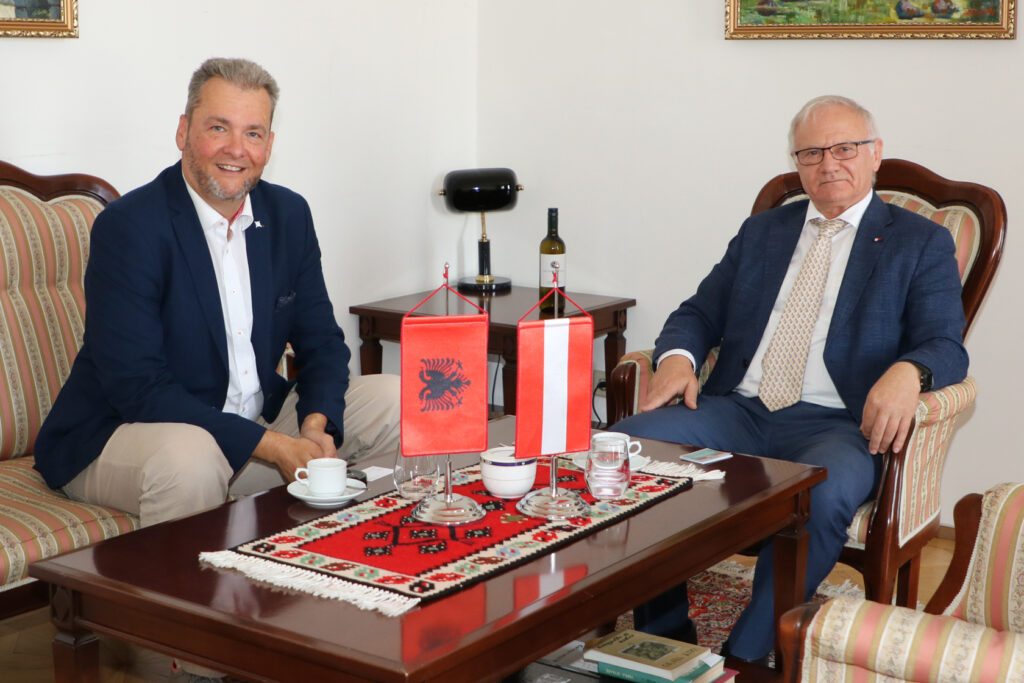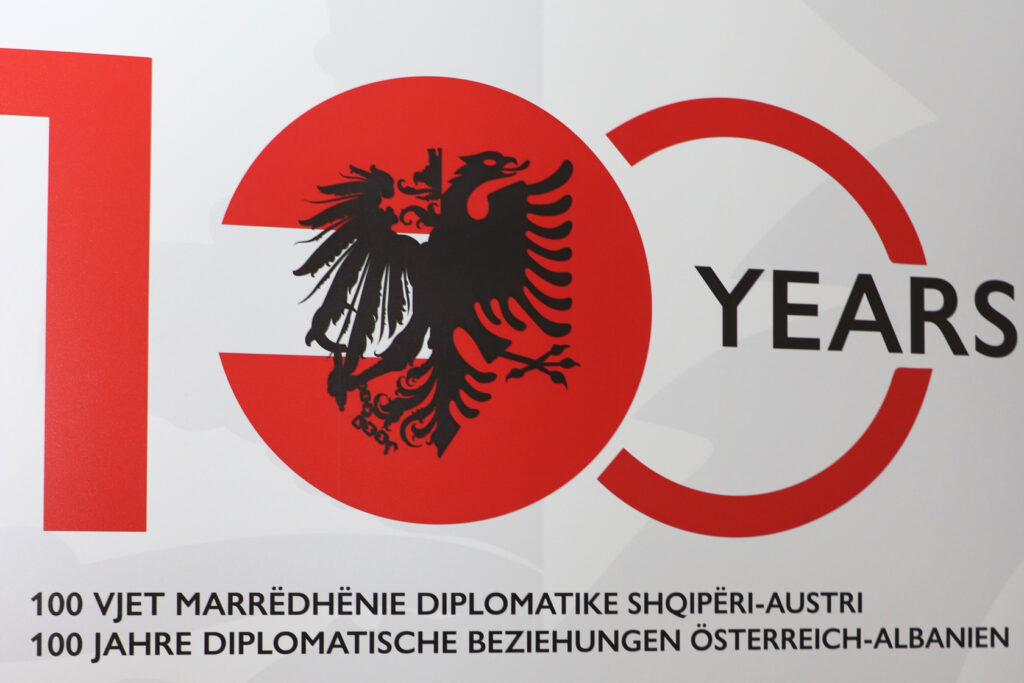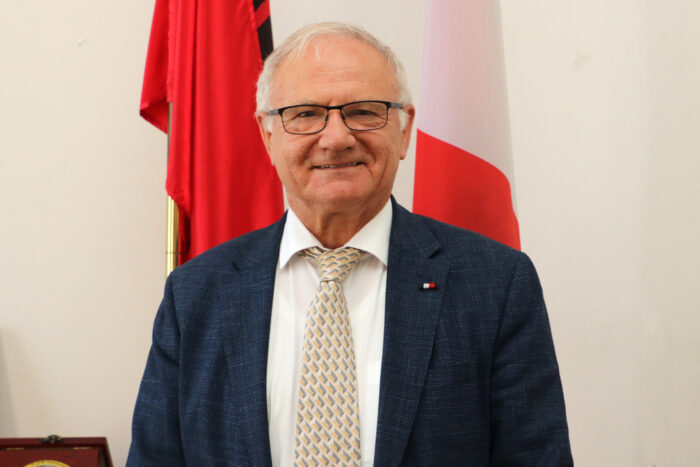Anyone who, as an external visitor like myself, has observed Albania’s development in the course of his numerous journeys, can state the following: Albania is in transition!
Some time ago, I had the pleasure of meeting the Albanian Ambassador to Austria, Mr. Roland Bimo, in person at his official residence in Vienna and talking to him about the developments in his country from the perspective of an experienced chief diplomat.
For visitors to Albania, it seems as if your country is currently experiencing a kind of gold rush, with construction going on everywhere and numerous infrastructure and tourism projects being built. How do you see the current developments in your country?
Ambassador Roland Bimo:
Describing and explaining in a convincing way such a rapid development in construction, infrastructure, expanding and improving tourism capabilities and such a dynamic entrepreneurial environment is not an easy job.
One might not totally agree with the economic policy that country has embarked on right now, but it seems obvious that most if not all the efforts are focused on development of tourism. Tourisms seems to be the main bet of the Albanian authorities on which they have trusted the economic future of the country.
New roads are spanning all around the country, new airports are under construction and new ones in planning. Several tunnels are drilled to shorten the distances to tourist destination.
Several studies are under examination to develop mountain tourism including winter sports for which the Albanian geography offers excellent opportunities.
On taxation policy, small businesses are exempted from taxes, value added tax for tourism enterprises is only 6 %, urban renaissance of the centres of all cities are only e few reasons that come immediately to mind, when one tries to understand and explain rapid pace of development. To all this which is backed by official data from different organizations that monitor Albania’s development, I would add the dynamic nature of the Albanians, bordering chaos. They do not hesitate to try to take new initiatives under very challenging and unsecure business environment. Of course, my observation might be far from the real reasons but that is what I think.
Where does this initial impulse come from that within a very short time a multitude of projects, including the construction of two new airports (Vlora, Kukes) or a billion-dollar port and tourism project in Durres, are being tackled almost simultaneously?
Hotel accommodation capacities are being expended and improved. Time of moving from one place to another and means of transportation are expanding thanks to new roads that are constructed and more are under construction.
It looks that a great impulse might have been given by very liberal economic policy, where PPP, Private-Public Partnership is considered and being used by the Government to encourage and strengthen private sector. In my judgment again the Achilles’ Heel of the Albanian economy is weak private sector that continue to be so much dependent the state financed projects and policies.
It is also due to the vision of the Albanian government and the priorities set for the future development. In a more general sense, it looks that maxim “freedom works” expresses itself quite clearly in Albania.

At the beginning of the nineties, numerous companies such as Austrian Airlines or Robert Rogner with his hotel in Tirana recognised Albania’s potential early on. Today, Turkish and Arab companies are increasingly investing in the country’s future. Have the Europeans missed the opportunity here?
Well, it is normal to have a gap between expectations and the reality. I am saying this having in mind the expectations for investments and more economic presence from European countries were higher. But having said that, on the other side if you look at the financial sector it is Raiffeisen Bank that is the main player in the banking sector and Vienna Insurance Group and UNIQUA in the insurance sector, that are the main players in Albania. Of course, we need very much more exposure to the investments from the west where the best know-how and expertise comes for management and almost everything that relates to the economic progress. Probably with the advancement of the accession process to the European Union, European companies will find a better business climate.
I recently visited Albania with a group of journalists and the question came up whether this construction and tourism boom might not eventually backfire? Does the government have some kind of master plan for the development of tourism?
Short answer is yes, it does. But in today’s world with so many unforeseen challenges and crises, there is a need for a plan as well as being flexible to adapt to different situations. Rapid developments in one sector may create pressure in others: like the need for more energy at a time of the world’s tremendous problems with the energy. Albania is bent on renewables. So far, our main source is hydropower. Government is liberalising in all possible ways the policies for encouraging investments in solar and wind power.
The managing director of the northern Albanian airport Kukes once said in an interview that the Albanian market has been undersupplied so far and that it should be possible in the future to welcome 10 to 15 million passengers per year in Albania! How do you see the future development, is Albania just at the beginning of a new tourist era?
I must apologize for not being able to comment on concrete figures. But what I am sure is that speedy development of Albania should have to do also with the very low base from where we started. We are just at the beginning of coming out, economically, from the long years of imposed self-isolation under communism. That is a convincing view in trying to explain a quick development. Transportation and in particular air travel had another pushing factor. Nearly as many Albanians that are in the country, have left to other countries in the last three decades. They keep close contacts with their relatives in the country. Their travel back and forth, together with foreign tourists that are showing increased interest, make the figures 10 to 15 million passengers per year quite possible in the near future.

Of course, the last question still has to be asked! Since June 2014, Albania has been an official candidate for membership of the European Union. When do you expect an admission of your country into the EU?
Since June 2014 a lot has happened. This time it was July, and the year was 2022 that Albania officially started membership accession negotiations. During these 8 years, enlargement policy of the EU has changed more than throughout its existence. EU enlargement policy has been revisited and crafted in a way that new members fulfil more stricter criteria then in the previous cases of enlargement. Which is good for the Union and for the new future members. But we notice that sometimes enlargement becomes a point of reference for member states to advance their national interests towards new members, for issues that can hardly have anything to do with the principles set by the European Union. Now the war of Russian aggression against Ukraine and the threat that Russia is presenting to the security of European Union member states, can be an opportunity for Albania but it can be also a new challenge.
One sure thing is that Albania will continue to follow the European Union integration path no matter how long it may or will take. We will do our best that this happens soon.
Martin Dichler
